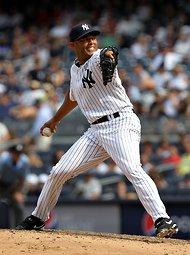Not Quite Closing Time
The New York Times
May 10, 2012
by Doug Glanville
As rare as a blown save from Mariano Rivera was the freak accident last week that put him on the disabled list for the first time since 2003, ending his season and perhaps his career.
I was a Yankee once, so I came to understand the power of a legacy in baseball. In 2005, I walked into the team’s spring-training locker room in Tampa, Fla., with a lot of preconceived notions about what that environment might contain. I grew up in Teaneck, N.J., and for years watched the bravado, the tantrums, the embarrassment of riches, the controversy, from Billy Martin to Reggie Jackson to George Steinbrenner to Dave Winfield.
Still, at that moment, the Yankees represented my new possibility, the team I was trying to make by the end of camp. Free agency had thrust me into uncertainty.
I arrived carrying a red Philadelphia Phillies bag — my previous employer. But once inside the Yankees clubhouse, each passing moment made that red look more and more out of place amid the elegant, unified and ubiquitous blue palette of the Yankee logo. My bag was whisked away as if some sort of alarm had gone off — the clubhouse assistants ran over, disarmed it and disappeared only to reappear with a more appropriate Yankee bag. I rolled my eyes, discreetly.
But then I began to see my new teammates. Derek Jeter, Jorge Posada, Alex Rodriguez, Jason Giambi, Gary Sheffield, Hideki Matsui. And Mariano Rivera.
In fact, I was surprised by the humility that coated that entire locker room. Matsui broke through the paparazzi to say hello; Sheffield offered to schedule a haircut for me; Posada made sure I had enough room next to his locker; Giambi, far from being defensive or silent on the topic, apologized for having used performance-enhancing drugs.
I assumed it had something to do with the fact that, as players, they were following some of the giants of the game and had standards to uphold. Besides, many of those giants hadn’t exactly gone away: Reggie Jackson was there, showing off his new ab workout in the weight room; Ron Guidry talked shop around the batting cage, teaching and watching; Yogi Berra cruised around on a golf cart. Yet I could not help noticing that even the greatest of this group gravitated to Rivera. He sat in his chair, holding court, surrounded by listeners.
Even then, he was considered the best in the business and of all-time. As is well known, he has dominated the sport for nearly two decades with just one pitch. The best hitters in baseball know exactly what is coming — when he will enter the game, what his plan is, what he’ll throw and how fast — and still they can do nothing to counter it. He has thrived despite having the ultimate disadvantage: the lack of an element of surprise.
On the field, trying to hit his fastball, something I had tried one summer as a member of the Phillies, makes you understand what people mean when they say “the gods gave him a lightning bolt for an arm.” Hitting him — or, again, trying to — made me wonder whether my hitter’s eyes were still working. The ball danced, it seemed to accelerate and defy gravity.
Off the field, you immediately noticed how the greatest closer of all-time was still humble, disarming any clubhouse tension, adding perspective to the most trying of times with a pat on the shoulder or a grin. I have been in locker rooms where the tension could be cut like a knife, and also in locker rooms so fulfilling that you couldn’t wait to be there. But never before had I experienced one that seemed to have a cloud of divine inspiration hovering over it. With his remarkable statistics, Rivera has been the personification of that cloud year in and year out. But he is also the big brother who makes sure that everyone gets to the family reunion or that you don’t forget to call your cousin Glenda on her 50th birthday. Everything he does feels as if it’s for some sort of greater good.
I would not play for much longer after the Yankees released me at the end of that 2005 spring training. But I came out of that locker room a changed and completed man. Something about the way baseball is constructed reinforces the idea that life (not just baseball) can change in the blink of an eye. There is a beauty to that understanding, because its earthy grounding allows you to relate to everyone around you, on the team and in the organization, no matter what their role.
It’s a lofty concept, and hard to find in one place or one person. But Rivera has that kind of soul. And it was no surprise that when news came of his injury, all of baseball wanted to fly its flags at half-mast. He is more than a pitcher you can’t hit. He embodies the spirit of the game, and the game, we all feel, cannot possibly end on this note. Mariano Rivera seems to agree.
Republished from The New York Times
Photo Credit: Nick Laham/Getty Images






